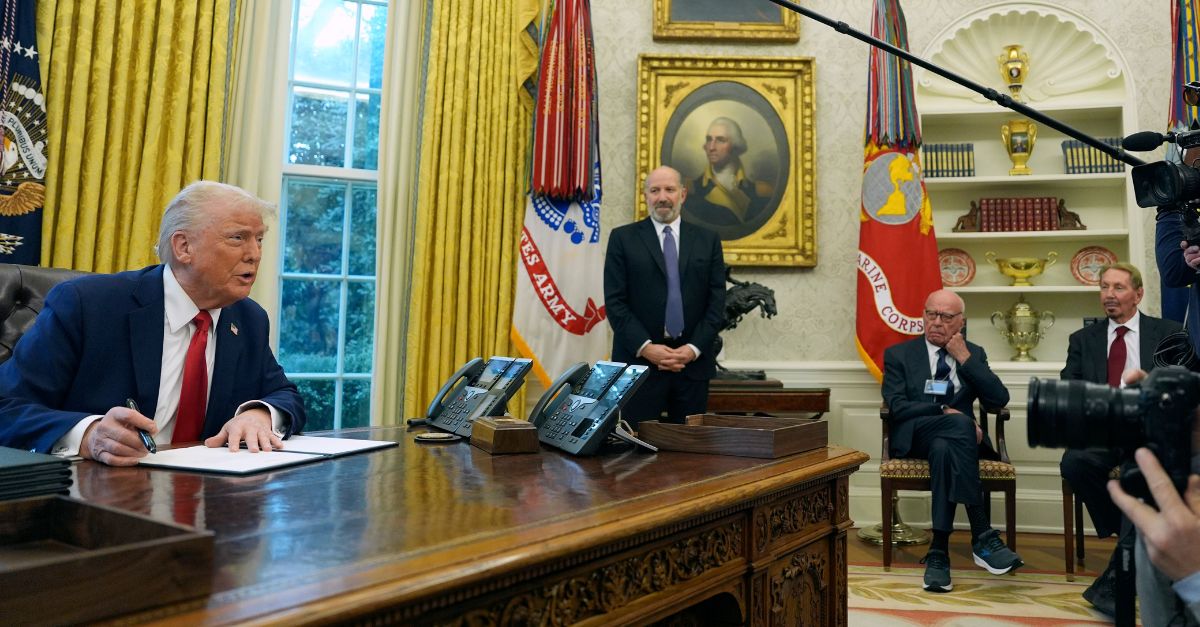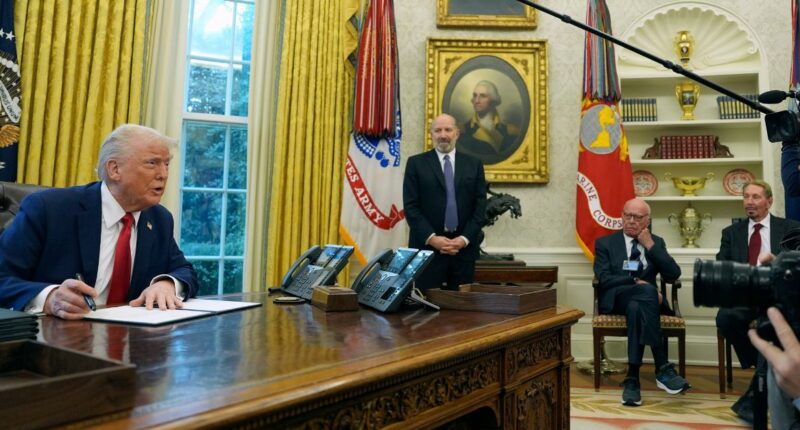
President Donald Trump, from left, speaks while signing an executive order as Commerce Secretary nominee Howard Lutnick, Rupert Murdoch and Larry Ellison, chairman and chief technology officer of Oracle Corporation, listen in the Oval Office of the White House, Monday, Feb. 3, 2025, in Washington (AP Photo/Evan Vucci).
The DOJ made its pitch for a stay pending appeal after the U.S. Court of International Trade (CIT) months ago set aside as “unlawful” President Donald Trump”s retaliatory tariffs against Mexico, Canada, China, and beyond — tariffs which the executive imposed through an attempted exercise of emergency powers to combat drug smuggling.
In June, the U.S. Court of Appeals for the Federal Circuit set oral arguments for 10 a.m. on July 31. U.S. Attorney General Pam Bondi decided to call attention to the proceeding Thursday morning.
“This morning, my @TheJusticeDept attorneys are going to court to defend President Trump’s tariffs — which are transforming the global economy, protecting our national security, and addressing the consequences of our exploding trade deficit,” Bondi said on X. “We will continue to defend President Trump’s executive authority in courtrooms across the country.”
Chief U.S. Circuit Judge Kimberly Moore kicked off arguments, joined by 10 of her colleagues. The key statute at issue is the International Emergency Economic Powers Act (IEEPA), which the Trump administration has cited in various declarations and legal filings in support of the tariffs’ legality.
As Law&Crime previously reported, the IEEPA grants the executive sweeping authority to quickly combat international economic crises and permits the executive to order sanctions as a rapid response to international emergencies. The CIT decided in May that the IEEPA did not actually “confer” the “unbounded authority” Trump claimed to have, because the Constitution “assigns Congress the exclusive powers to ‘lay and collect Taxes, Duties, Imposts and Excises,’ and to ‘regulate Commerce with foreign Nations.'”
The Trump administration responded by immediately seeking a stay at the Federal Circuit, calling the lower court’s decision an “unprecedented and legally indefensible injunction permanently barring the United States from implementing tariffs involving dozens of countries, from the United Kingdom to the People’s Republic of China to the European Union—tariffs that are central to the President’s foreign-policy and economic agendas.”
Writing that the decision was “rife with legal error” and an incursion against Trump’s authority, the DOJ demanded a stay pending appeal to “prevent immediate, irreparable harm to the Nation.”
More Law&Crime coverage: Constitutional law professor defends legality of Trump tariffs by citing 1930 law Ronald Reagan blamed for worsening Great Depression
Arguing for the DOJ was Brett Shumate, an assistant attorney general in the civil division who has represented the administration in several other big cases.
Shumate began by arguing that Congress has “long given the president broad discretion” to act on matters of national security and emergencies, and that for decades IEEPA has been “one of the most powerful tools” in the executive’s arsenal.
Almost as soon as Shumate started speaking, one of the judges immediately questioned: “But IEEPA has rarely been used, hasn’t it?” As Thursday’s oral arguments were available by audio livestream only, Law&Crime was not immediately able to confirm which judge was speaking at different points during the hearing.
Shumate answered that IEEPA is used “all the time,” but acknowledged it’s the “first time” the statute has been used for tariffs in some 50 years of the statute’s existence.
The DOJ lawyer then stated that then-President Richard Nixon’s 1971 tariff order under the Trading with the Enemy Act of 1917 (TWEA) used the “exact same language” Trump is now using” — “regulate importation” language that stood up to judicial scrutiny in the 1975 case United States v. Yoshida International, Inc.
In the Yoshida case, the Federal Circuit decided that Congress, “in enacting [TWEA], authorized the President, during an emergency, to exercise the delegated substantive power, i.e., to ‘regulate importation,’ by imposing an import duty surcharge or by other means appropriately and reasonably related . . . to the particular nature of the emergency declared.”
But the Yoshida court also opined that a president cannot merely utter “national emergency” to “rewrite the tariff schedule.”
“The mere incantation of ‘national emergency; cannot, of course, sound the death-knell of the Constitution. Nor can it repeal prior statutes or enlarge the delegation in § 5(b),” the opinion said, referring to the section of the statute that governs what the president may do in the realm of international trade during a “time of war or during any other period of national emergency declared by the President.”
“The declaration of a national emergency is not a talisman enabling the President to rewrite the tariff schedules, as it was not in this case,” the opinion also said.
One of the circuit judges during Thursday’s hearing identified a “problem” with DOJ’s argument there, namely that Nixon’s tariffs by statute were “far narrower” than Trump’s tariffs and that “not all” tariffs are necessarily permitted. For one thing, the judge said, IEEPA “doesn’t mention the word tariffs” or duties “anywhere.”
“I don’t think that’s unusual,” Shumate shot back.
“What do you mean it’s not unusual?” the judge asked incredulously. “It is very unusual in a trade framework.”
“[IEEPA] didn’t need to specifically use the word tariffs,” Shumate replied, saying the words “regulate importation” in IEEPA must mean that at least some tariffs are authorized.
Several other judges, at times apparently frustrated by the lack of clear yes or no answers, tried to pin down Shumate on whether Trump had “unbounded” authority to declare an emergency and unilaterally impose tariffs globally.
Love true crime? Sign up for our newsletter, The Law&Crime Docket, to get the latest real-life crime stories delivered right to your inbox.
If the IEEPA was a ratification of Yoshida, one judge commented, then Trump’s tariff authority isn’t unlimited, because “regulate equals tariffs that are within the statutory framework enacted by Congress.”
“If Congress ratified Yoshida, then Congress ratified all of it,” including limits on the president’s authority to impose tariffs, the jurist added, accusing the DOJ of “discarding” aspects of the Yoshida case “that you don’t like.”
Another judge chimed in to say that it “seems Yoshida is telling us no, that the president doesn’t have the authority to rewrite the tariff schedule.”
Shumate said that the Trump is not asking the court to recognize “unbounded” authority, and defended the drug-trafficking tariffs as a bargaining chip for leverage so Trump could address the national emergency he identified. The “severe spike” in the trade deficit is part of that, the DOJ lawyer added.
At one point, another member of the judicial panel all but threw up his hands and asked what the court can do here.
“What can we do as a court to cabin the president’s authority under the statute” if, as Shumate maintained, Trump’s national emergency determinations are at most unreviewable or at least subject to “broad deference” from the courts, the judge asked.
Representing wine and spirits importer and distributor V.O.S. Selections, Inc., Plastic Services and Products, LLC, MicroKits, LLC, FishUSA Inc. and Terry Precision Cycling LLC, was Neal Katyal, a former acting solicitor general of the United States and legal commentator.
Katyal reiterated the point made in his brief that Congress “did not delegate to the President the power to unilaterally impose tariffs on any country, at any rate, at any time, for any reason when it passed” the IEEPA. Furthermore, “thousands of businesses” and the pocketbooks of “millions of consumers across the country” are at risk of “irreparable harm” to their interests.
“Defendants’ argument that the President has virtually unlimited unilateral tariff authority under IEEPA that is unreviewable by the judiciary is not likely to succeed on appeal. The motion for a stay should be denied,” Katyal’s response to the Trump administration said.
In court, Katyal — emphasizing that the Yoshida decision contained “very strong limits” on tariff authority — said that the Trump administration is asserting a “sweeping” power the likes of which no president has claimed to have in more than 200 years. This, Katyal said, is “as major a question as it gets.”
“No president has ever read IEEPA this way,” Katyal said, noting that the statute has a “freestanding requirement of an unusual and extraordinary threat.”
That “unusual and extraordinary threat” language hasn’t been met here, Katyal said, because Trump himself has said the trade deficit his national emergency declaration aims to fix is a “persistent” one that has affected the United States for decades.
Beyond the issue of whether Congress actually delegated sweeping authority to Trump to impose unilateral tariffs, Katyal further suggested that the major questions doctrine could be fatal to Trump’s tariffs.
“IEEPA tariffs aren’t an elephant in a mousehole, it’s a galaxy in a keyhole,” he quipped.
The Supreme Court has applied the major questions doctrine and “rejected agency claims of regulatory authority,” a congressional research paper explains, when “(1) the underlying claim of authority concerns an issue of ‘vast ‘economic and political significance,’ and (2) Congress has not clearly empowered the agency with authority over the issue.”
On behalf of the states of Arizona, Colorado, Connecticut, Delaware, Illinois, Maine, Minnesota, Nevada, New Mexico, New York, Oregon and Vermont, Oregon Solicitor General Benjamin Gutman spoke next and piggybacked on Katyal’s argument that the trade deficit does not pose an “unusual and extraordinary threat.”
He claimed that Trump’s executive order only addressed the deficit in “one line,” catching one judge’s attention. She wondered first if they were reading the same executive order because Trump’s order was “clear” on the trade deficit amelioration justification.
While Gutman answered that he was talking about the national emergency declaration portion of the order, when presented an opportunity, he shortly thereafter walked back his “one line” remark.
Another judge then floated the idea that it’s possible to find that the “unusual and extraordinary threat” language has been met, since one could make the case that the trade deficit, though “persistent,” has had “recent causes and effects” that support an emergency declaration after all.
Colin Kalmbacher contributed to this report.







